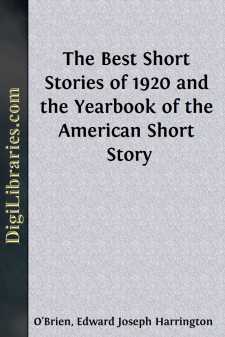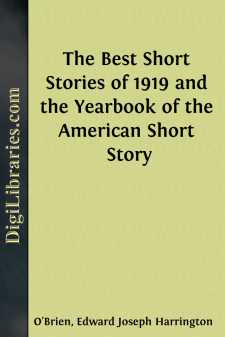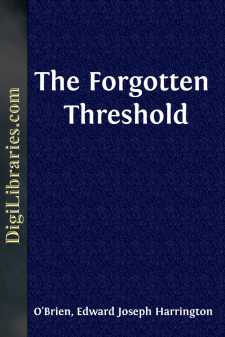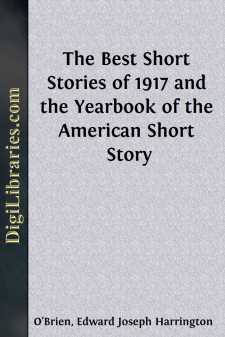Categories
- Antiques & Collectibles 13
- Architecture 36
- Art 48
- Bibles 22
- Biography & Autobiography 813
- Body, Mind & Spirit 142
- Business & Economics 28
- Children's Books 15
- Children's Fiction 12
- Computers 4
- Cooking 94
- Crafts & Hobbies 4
- Drama 346
- Education 46
- Family & Relationships 57
- Fiction 11829
- Games 19
- Gardening 17
- Health & Fitness 34
- History 1377
- House & Home 1
- Humor 147
- Juvenile Fiction 1873
- Juvenile Nonfiction 202
- Language Arts & Disciplines 88
- Law 16
- Literary Collections 686
- Literary Criticism 179
- Mathematics 13
- Medical 41
- Music 40
- Nature 179
- Non-Classifiable 1768
- Performing Arts 7
- Periodicals 1453
- Philosophy 64
- Photography 2
- Poetry 896
- Political Science 203
- Psychology 42
- Reference 154
- Religion 513
- Science 126
- Self-Help 84
- Social Science 81
- Sports & Recreation 34
- Study Aids 3
- Technology & Engineering 59
- Transportation 23
- Travel 463
- True Crime 29
The Best Short Stories of 1920 and the Yearbook of the American Short Story
Categories:
Description:
Excerpt
I suppose there is no one of us who can honestly deny that he is interested in one way or another in the American short story. Indeed, it is hard to find a man anywhere who does not enjoy telling a good story. But there are some people born with the gift of telling a good story better than others, and of telling it in such a way that a great many people can enjoy its flavor. Most of you are acquainted with some one who is a gifted story-teller, provided that he has an audience of not more than one or two people. And if you chance to live in the same house with such a man, I think you will find that, no matter how good his story may have been when you first heard it, it tends to lose its savor after he has become thoroughly accustomed to telling it and has added it to his private repertory.
A writer of good stories is really a man who risks telling the same story to many thousand people. Did you ever take such a risk? Did you ever start to tell a story to a stranger, and try to make your point without knowing what sort of a man he was? If you did, what was your experience? You decided, didn't you, that story-telling was an art, and you wondered perhaps if you were ever going to learn it.
The American story-teller in the magazines is in very much the same position, except that we have much more patience with him. Usually he is a man who has told his story a good many times before. The first time he told it we clapped him on the back, as he deserved perhaps, and said that he was a good fellow. His publishers said so too. And it was a good story that he told. The trouble was that we wanted to hear it again, and we paid him too well to repeat it. But just as your story became rather less interesting the twenty-third time you told it, so the stories I have been reading more often than not have made a similar impression upon me. I find myself begging the author to think up another story.
Of course, you have not felt obliged to read so many stories, and I cannot advise you to do so. But it has made it possible for me to see in some sort of perspective, just where the American short story is going as well as what it has already achieved. It has made me see how American writers are weakening their substance by too frequent repetition, and it has helped me to fix the blame where it really lies.
Now this is a matter of considerable importance. One of the things we should be most anxious to learn is the psychology of the American reader. We want to know how he reacts to what he reads in the magazine, whether it is a short story, an article, or an advertisement. We want to know, for example, what holds the interest of a reader of the Atlantic Monthly, and what holds the interest of the reader of the Ladies' Home Journal.
It is my belief that the difference between these various types of readers is pretty largely an artificial difference, in so far as it affects the quality of entertainment and imaginative interest that the short story has to offer. Of course, there are exceptional cases, and I have some of these in mind, but for the most part I can perceive no essential difference between the best stories in the Saturday Evening Post and the best stories in Harper's Magazine for example. The difference that every one feels, and that exists, is one of emphasis rather than of type. It is a difference which is shown by averages rather than one which affects the best stories in either magazine. Human nature is the same everywhere, and when an artist interprets it sympathetically, the reader will respond to his feeling wherever he finds it.
It has been my experience that the reader is likely to find this warmly sympathetic interpretation of human nature, its pleasures and its sorrows, its humor and its tragedy, most often in the American magazines that talk least about their own merit....





